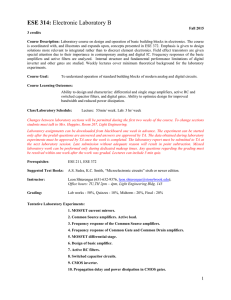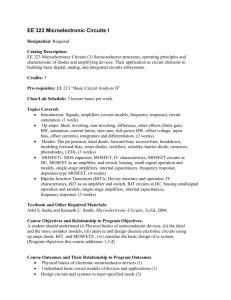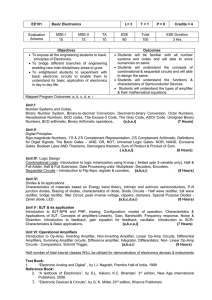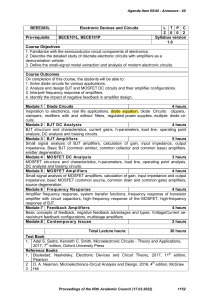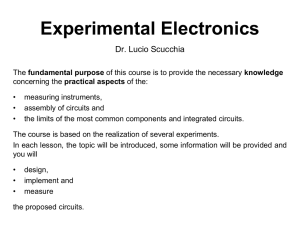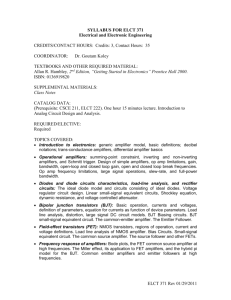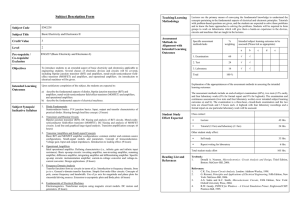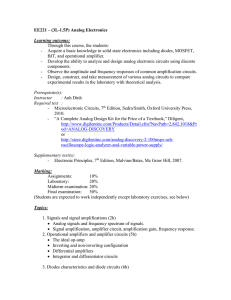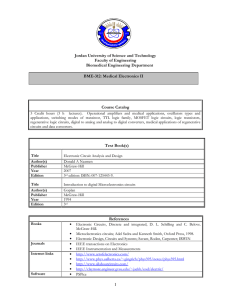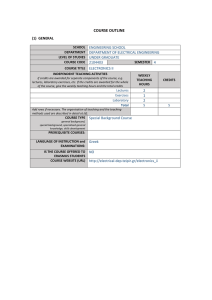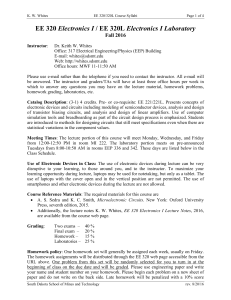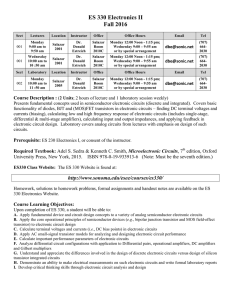ESE 372 Electronics
advertisement
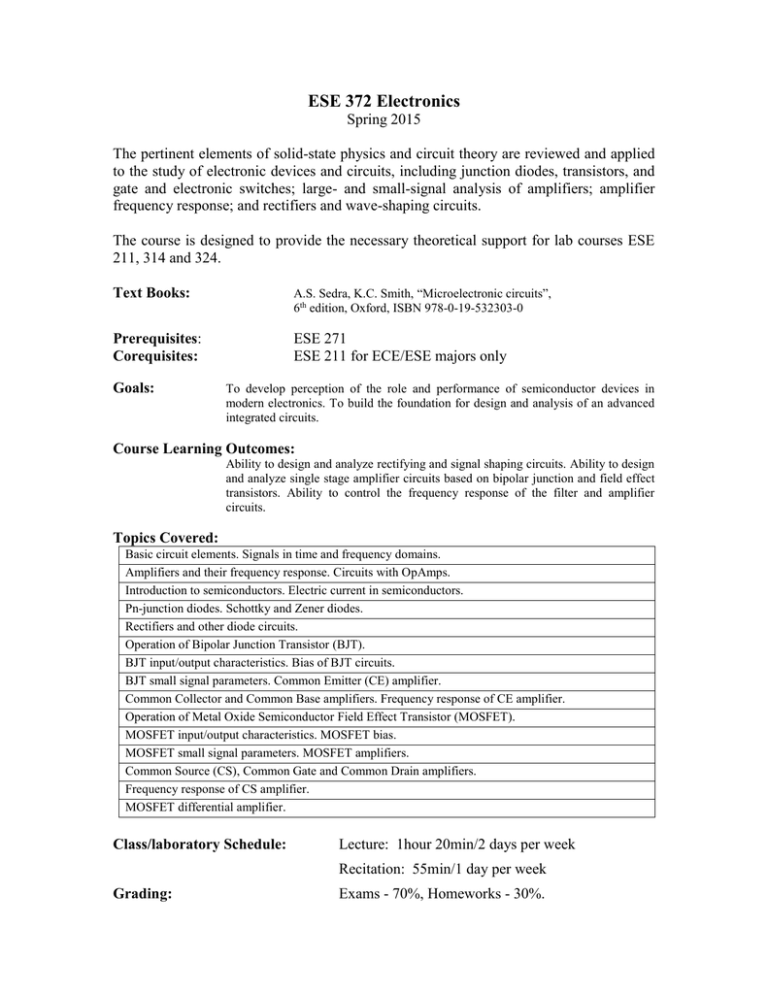
ESE 372 Electronics Spring 2015 The pertinent elements of solid-state physics and circuit theory are reviewed and applied to the study of electronic devices and circuits, including junction diodes, transistors, and gate and electronic switches; large- and small-signal analysis of amplifiers; amplifier frequency response; and rectifiers and wave-shaping circuits. The course is designed to provide the necessary theoretical support for lab courses ESE 211, 314 and 324. Text Books: A.S. Sedra, K.C. Smith, “Microelectronic circuits”, 6th edition, Oxford, ISBN 978-0-19-532303-0 Prerequisites: Corequisites: ESE 271 ESE 211 for ECE/ESE majors only Goals: To develop perception of the role and performance of semiconductor devices in modern electronics. To build the foundation for design and analysis of an advanced integrated circuits. Course Learning Outcomes: Ability to design and analyze rectifying and signal shaping circuits. Ability to design and analyze single stage amplifier circuits based on bipolar junction and field effect transistors. Ability to control the frequency response of the filter and amplifier circuits. Topics Covered: Basic circuit elements. Signals in time and frequency domains. Amplifiers and their frequency response. Circuits with OpAmps. Introduction to semiconductors. Electric current in semiconductors. Pn-junction diodes. Schottky and Zener diodes. Rectifiers and other diode circuits. Operation of Bipolar Junction Transistor (BJT). BJT input/output characteristics. Bias of BJT circuits. BJT small signal parameters. Common Emitter (CE) amplifier. Common Collector and Common Base amplifiers. Frequency response of CE amplifier. Operation of Metal Oxide Semiconductor Field Effect Transistor (MOSFET). MOSFET input/output characteristics. MOSFET bias. MOSFET small signal parameters. MOSFET amplifiers. Common Source (CS), Common Gate and Common Drain amplifiers. Frequency response of CS amplifier. MOSFET differential amplifier. Class/laboratory Schedule: Lecture: 1hour 20min/2 days per week Recitation: 55min/1 day per week Grading: Exams - 70%, Homeworks - 30%. Program Outcomes (a) an ability to apply knowledge of mathematics, science and engineering (b1) an ability to design and conduct experiments (b2) an ability to analyze and interpret data (c) an ability to design a system, component, or process to meet desired needs within realistic constraints such as economic, environmental, social, political, ethical, health and safety, manufacturability, and sustainability (d) an ability to function on multi-disciplinary teams (e) an ability to identify, formulate, and solve engineering problems (f) an understanding of professional and ethical responsibility (g) an ability to communicate effectively (h) the broad education necessary to understand the impact of engineering solutions in a global, economic, environmental, and societal context (i) a recognition of the need for, and an ability to engage in life-long learning (j) a knowledge of contemporary issues (k) an ability to use the techniques, skills, and modern engineering tools necessary for engineering practice Any other outcomes and assessments? % contribution* 40 5 10 10 10 5 5 10 5 * Assume that the total contribution of any course will be 100%. Use the right hand column to indicate the approximate percent that the left hand columns contribute to the overall course. Disability Support Services (DSS) Statement: If you have a physical, psychological, medical or learning disability that may impact your course work, please contact Disability Support Services, ECC (Educational Communications Center) Building, room 128, (631) 632-6748. They will determine with you what accommodations, if any, are necessary and appropriate. All information and documentation is confidential. Students who require assistance during emergency evacuation are encouraged to discuss their needs with their professors and Disability Support Services. For procedures and information go to the following website: http://www.stonybrook.edu/ehs/fire/disabilities ] Academic Integrity Statement: Each student must pursue his or her academic goals honestly and be personally accountable for all submitted work. Representing another person's work as your own is always wrong. Faculty are required to report any suspected instances of academic dishonesty to the Academic Judiciary. Faculty in the Health Sciences Center (School of Health Technology & Management, Nursing, Social Welfare, Dental Medicine) and School of Medicine are required to follow their school-specific procedures. For more comprehensive information on academic integrity, including categories of academic dishonesty, please refer to the academic judiciary website at http://www.stonybrook.edu/commcms/academic_integrity/index.html Critical Incident Management Statement: Stony Brook University expects students to respect the rights, privileges, and property of other people. Faculty are required to report to the Office of Judicial Affairs any disruptive behavior that interrupts their ability to teach, compromises the safety of the learning environment, or inhibits students' ability to learn. Faculty in the HSC Schools and the School of Medicine are required to follow their school-specific procedures.
